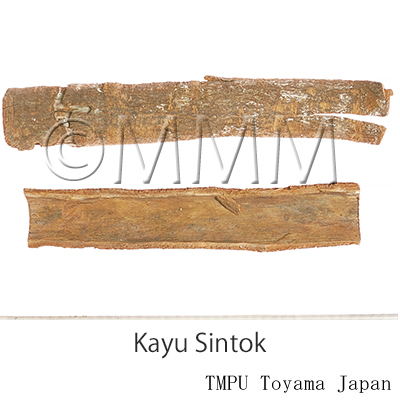Crude drug sample data base
※Click on the image to enlarge it.
The capital city, provincial capital city or the representative
location of its administrative area is indicated.
location of its administrative area is indicated.
Production area information
https://ethmed.toyama-wakan.net/img/pin_san.png
-7.575488699999999
110.82432719999997
Collection information
Republic of Indonesia,Surakarta, Central Java Prov.
https://ethmed.toyama-wakan.net/img/pin_nyu.png
Scientific information data base
| Crude drug name | Indonesian name, English name | Sintok | ||||
|---|---|---|---|---|---|---|
| crude drug image |
| |||||
| Original plant name | Cinnamomum sintok Bl. | |||||
| Family name | Lauraceae | |||||
| Used part | Bark | |||||
| Distribution area | It comes from Java and Sumatra; it occurs in Java (Indonesia) from 700 to 1700 m altitude. It also grows in Sumatra and Kalimantan [201]. | |||||
| Description | A tree, 20-35 m high, bark smells and taste like cloves, brittle, outer parts grey, inner parts are reddish-white and turn orange when exposed to the air. Mature fruits are black in color [201]. | |||||
| Frequency in use | Moderate | |||||
| Common uses | It is commonly used for flavouring food. | |||||
| Chemical constituent | Terpenoids (Essential oils) | |||||
| Medical system | Indonesian medicine (Jamu) | |||||
| Traditional usage | It is used together with cardamom to make a liniment which is applied on the forehead to cure headache and cold after parturition. It is also used as an anthelmintic, in treating insect bites, abdominal colic, diarrhea, syphilis. To treat animal bites, first the wound is pricked with rind of Tamarindus indica to remove dirty blood and put crushed Sintok on the wound. It is considered a very good medicine, especially for stomach cramps and diarrhea (including persistent diarrhea). Sintok is used either as a liniment or internally in a mixture with other medicine for venereal diseases [201]. Soaking bark in water will cause the water to foam and it can be used for a hair wash to make the hair shiny and retain its black color. | |||||
| References | Reference book Tips! | [201] K. Heyne, Tumbuhan Berguna Indonesia, Vols. 1-4, 1987. Diedarkan Oleh Koperasi Karyawan Departemen Kehutanan, Jakarta, Indonesia. Vol. 2, p 804. [204] de Guzman, C.C. and Siemonsma, J.S. (Editors), 1999. Plant Resources of South-East Asia No. 13 Species. Backhuys Publishers, Leiden, Netherlands. p 97. [215] Kamus nama tanaman obat Indonesia ( Dictionarv of Indonesian medicinal plants): Indonesia (local names) - Latin name. p 238. [222] P.T. Eisai Indonesia: Medical Herb Index in Indonesia (Second edition).1995. p 11. | ||||
| Last renewal date | 2024/03/13 | |||||





